Molecular Coffee Startup Atomo Raises $9M in Seed Round

Atomo Coffee, maker of “molecular coffee” made not from coffee beans but from upcycled ingredients, announced last week the close of a $9 million seed funding round. S2G Ventures, whose portfolio includes Beyond Meat and Ripple, along with AgFunder and Bessemer Venture Partners participated in the round. Atomo will use the funding to build a pilot facility in Seattle, and the company aims to bring its first product, canned cold brew coffee, to market in the second quarter of 2021.
The seed round comes a year after Atomo secured $2.6 million in seed funding from Horizon Ventures, investor in food tech companies Perfect Day and Impossible Foods. This funding was used to develop a prototype of the product and expand its team, which included adding Bryan Crowley, former CEO of Soylent and current CEO of ZenWTR, as a board advisor.
Atomo Coffee, co-founded by CTO Jarret Stopforth, formerly of Chobani and Campbell Soup Company, and CEO Andy Kleitsch, is seeking to address the negative environmental impact of coffee while also creating a brew that is less bitter than traditional coffee. Kleitsch said Atomo quickly caught the eye of investors that were looking for innovations to address the issue of sustainability in coffee production. In a blog post announcing the investment, S2G Ventures noted its goal to “improve sustainability within non-center-of-the plate categories,” including coffee, the production of which causes the deforestation of 250,000 acres of rainforest a year.
“Atomo has the unique ability to bring consumers an environmentally conscious cup of molecular coffee without compromising the unique flavor profiles and desires consumers have grown to expect,” S2G Ventures managing director Chuck Templeton said in an email to BevNET. “With American’s consuming approximately 450 million cups of coffee each day and rising, Atomo offers an innovative way to scale and meet growing consumer demands while reducing the climate impact of coffee.”
To create the coffee, Stopforth and Kleitsch identified which of the nearly 1,000 compounds in a roasted coffee bean contribute most significantly to the aroma, flavor, body and mouthfeel of coffee. Then, they sought out upcycled ingredients from waste streams such as plant stems, pits, leaves and seeds which have similar compounds to those found in coffee. Through a proprietary method, these ingredients are “reacted” to elevate these similar compounds as Atomo works to match traditional coffee “note for note” while creating a brew that is less bitter.
Caffeine is precisely dosed for each product, with its canned cold brew containing 100 mg of caffeine per can. This ability to control caffeine content will also allow Atomo to make “the first true no-caf” coffee, Kleitsch noted. They will also have the ability to increase levels of micronutrients such as polyphenols in their products.
With its new facility, Kleitsch said Atomo will be able to produce enough coffee to support placement in local and regional retailers. As Atomo, which sources its ingredients from U.S. farmers, eventually looks to scale its production and expand nationally, Kleitsch said there does not seem to be any shortage of supply for its upcycled ingredients.
“We’re just on the tip of the iceberg as far as exploring even all the different ingredients that we could use in our coffee,” Kleitsch said.

According to Kleitsch, Atomo’s main goal is to “disrupt every category of coffee,” starting with canned cold brew and nitro cold brew on tap and expanding to K-cups, grounds and eventually beans. Kleitsch said Atomo has been in talks with several regional specialty retailers, with the environmentally conscious aspect of the product serving as a major selling point.
“I think a lot of discussions have been driven by the fact that consumers are really more concerned now than ever about sustainability,” he said. “They want to make sustainable choices in their purchasing, and they’re looking for products like ours, that are better tasting and better for the planet.”
Though it has plans to launch its product through e-commerce as well, Atomo’s main focus to start will be retail, as Kleitsch said it’s important for Atomo to be on shelves next to conventional coffee products in order to give consumers the option to make a “sustainable choice.” While there are many coffee products which use sustainable harvesting methods, because they are still using a conventional coffee bean, Kleitsch believes Atomo has no direct competitors. He noted that ultimately the idea with Atomo is not to eliminate traditional coffee, but to “alleviate the demand” for deforestation in its production.
“We want coffee farmers to continue to make coffee and we want them to be paid a fair price for what they produce, which they’re not being paid today, unfortunately,” Kleitsch said. “What we want to avoid is having coffee farmers continue deforestation to grow more coffee.”
Unlike dairy or meat, there are no standards of identity for coffee, allowing for coffee substitutes made from mushroom or chicory to be labelled as “coffee,” and Kleitsch said Atomo plans to label its products as such when it launches next year.
“We really think that coffee is around the experience and the results,” Kleitsch said. “If we can match exactly the taste, the body, the mouthfeel and the aroma and match the experience, which is how you brew it and the caffeine jolt you receive from that coffee, then we think that truly is capturing the entire coffee experience.”
















